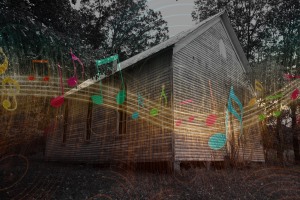Writing music.
In words.
Is simply not possible.
I tried. In my first published book, Notes of a Piano Tuner, I wanted desperately to convey the thrill of hearing a certain piece of music played on a freshly tuned piano. Everything about that time and place added to the intensity of those few bars—an old wooden church house twenty miles out a dirt road in the Arkansas Ozarks, an old upright piano that had somehow survived a century of use to remain remarkably musical, and a rainy late spring afternoon. As the storm front moved on to the east, a green cast permeated the outside air. A wasp buzzed against the nearby window, one of those tall narrow windows with watery glass common in old churches where they needed the light but didn’t want congregants distracted by whatever went on outside.
Moist air carries sound waves better than dry air. The combination of moist air, the resonance of the old church, the magical ancient piano, and the harmonies of that particular music transcended anything I could say with words. The waves rolled up from the soundboard, bounced off the high church ceiling, and resonated through my chest like a physical force.
Well, it was a physical force.
My hair stood up. I got goosebumps.
There’s something about fourths and fifths that does it for me. And old hymns, which make full use of fourths and fifths. Simple, basic harmonies.
An acoustic physicist could probably explain it. The mathematics of tuning never quite penetrated my skull. My dad taught me to tune by ear. I didn’t want or need to understand that when a string produced a fundamental pitch, say the note ‘A,’ it also formed partials. Partials were, predictably, partial vibrations of the string which produce other pitches. So for the note ‘A’ vibrating along a single string, the partials also vibrated in tones of fourths, fifths, other octaves and so forth up into an entire overtone series.
For more than you ever wanted to know about overtones, check out this article.
Complicated stuff and mostly irrelevant to a tuner who works by ear. My dad, I, and now my son understand these things internally.
To the point, the strings on the old upright in that church still created perfect overtones. As those chords rolled from my fingers, the overtones blended with the fundamental notes I played to create such a rich experience that I actually got tears in my eyes.
I wanted to share that. When I wrote that story, I tried to think of how to convey my experience. I considered writing the actual music on the page, but unless someone knew how to read music, that notation would mean nothing. I blathered on about feeling the effects of the music but that alone wouldn’t make someone’s hair stand up.
I ended up writing the words that accompany that particular sequence of music thinking that if someone heard the words, they would hear the music.
Well, maybe some did. But unfortunately, most readers evidently took the meaning of the words as the message I wanted to convey and never heard the music at all.
Wrong. Not even close. I didn’t want the message of the words to have anything to do with my story. The message of the words wasn’t my message. In fact, they were about as far from my intent as they could possibly be.
The words were “Amazing Grace, how sweet the sound,” etc. I wrote the entire first verse, because those were the notes, the harmonies, the chords and overtones of my experience.
As a result, a lot of readers of my book assumed that I had been ‘saved.’ That my awestruck experience resulting from that loaded afternoon had to do with finding God, getting religion, and all the rest of that stuff.
I’m sorry. That’s not what I meant. Not what I meant at all.
And it strikes me now that religion is a lot like that, all about the words without hearing the music.
